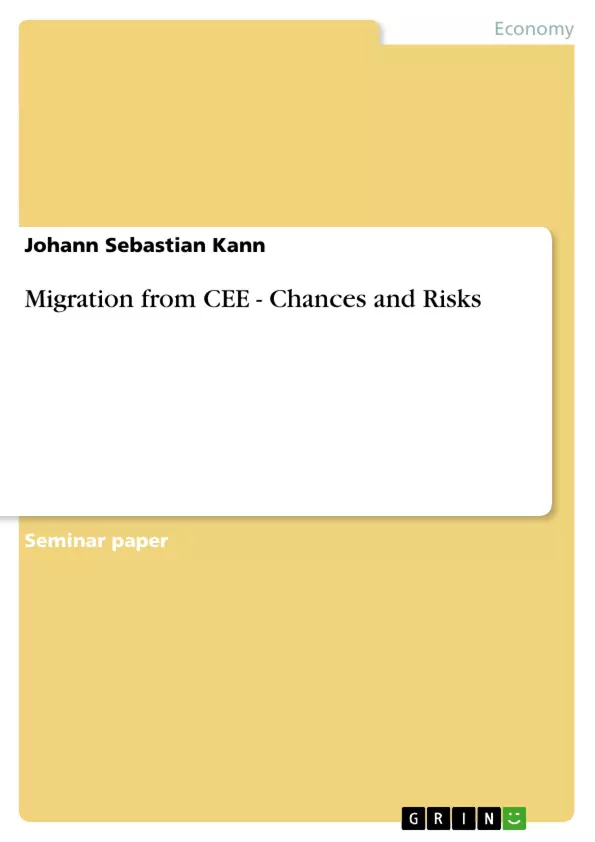The debate on movement of people (migration) ranges, 10 days after the probably most
important historical moment of European history in the 21st century, from positive to
pessimistic.
Migration undoubtedly presented a excellent opportunity for advancing human welfare, but
some clashes resulting from economical, historical or political failures made weighing its
costs and benefits very difficult: effects that look like “benefits” from a liberal economic point
of view became “costs” when viewed from politics and with emotion in mind.
First, the author will focus on major economic and political questions and perspectives that
are currently clashing eachother in public debates.2 In fact the current debate on European
Enlargement started already a couple of decades ago when people and populations moved
throughout Europe from South-East Europe and Northern Africa to wealthy countries, such as
Germany, France, UK or Scandinavia.3 Today, critics of EU enlargement mainly focus their
arguments on the changes, problems and things that went wrong through immigration or due
to false migration policy. 4 [...]
2 Should Turkey, Romania, Bulgaria, Croatia, or even Ukraine join the European Union in the future ? What is
going to happen to people outside the European Union + other CEE that will look for job opportunities in our
host countries ?
3 - With the result that some immigrants did not find a job, did not actively integrate themselves into their new
local community or did not get integrated due to many reasons.
4 – Nevertheless debates about jobmarket problems resulting from (current and future) European Enlargement
should not mixed up with integration problems resulting with immigrants from Non - EU countries.
Inhaltsverzeichnis (Table of Contents)
- The clash between Economical and Political Perspectives
- From an economic perspective
- From a political point of view
- The Risks of Migration
- Chances from European Enlargement: The creation of a fluid employment market
- Standards of Minimum Wages
- Freedom to move: decentralized public and private employment centers.
- Conclusion
Zielsetzung und Themenschwerpunkte (Objectives and Key Themes)
The article explores the economic and political perspectives on migration in the context of European enlargement. It examines the potential benefits and risks of migration from both an economic and a political standpoint, highlighting the challenges of integrating migrants and ensuring equal opportunities. The author also delves into the complexities of creating a fluid employment market in a larger European Union, emphasizing the need for social and economic standards to facilitate fair competition and integration.
- Economic and political perspectives on migration
- Potential benefits and risks of migration
- Integration challenges for migrants
- Creation of a fluid employment market within the EU
- Social and economic standards for a fair and integrated EU
Zusammenfassung der Kapitel (Chapter Summaries)
- The clash between Economical and Political Perspectives: This section analyzes the opposing views on migration from economic and political perspectives. While economists see migration as a driver of economic growth, particularly by providing access to cheap labor, political concerns center around integration challenges and the potential impact on existing workers' wages.
- The Risks of Migration: This section explores the potential drawbacks of migration, focusing on the impact on sending countries' human capital and the political challenges of ensuring fair treatment for both migrants and existing residents. The author highlights the potential for increased income inequality within receiving countries and the need for policies to mitigate these effects.
- Chances from European Enlargement: The creation of a fluid employment market: This chapter examines the opportunities presented by European enlargement in terms of creating a more fluid employment market. The author argues for the need for standards of minimum wages and decentralized employment centers to facilitate the free movement of workers within the expanded EU.
Schlüsselwörter (Keywords)
The primary themes of this article focus on migration, European enlargement, economic development, political challenges, integration, employment market, social and economic standards, and human capital.
Frequently Asked Questions
What are the main economic benefits of migration from CEE countries?
From an economic perspective, migration provides access to labor, helps fill job market gaps, and can drive growth in host countries by providing flexible human capital.
What are the political risks associated with EU enlargement migration?
Political risks include challenges in social integration, potential downward pressure on wages for local workers, and emotional or nationalist backlash in host communities.
How does migration affect the "sending" countries?
Sending countries may face "brain drain" or a loss of human capital, which can hinder their own domestic economic development in the long term.
What is a "fluid employment market" in the EU?
It refers to the creation of a decentralized system where workers can move freely across borders to where their skills are needed, supported by minimum wage standards.
Why is the distinction between EU and Non-EU migration important?
The debate often mixes up integration issues of non-EU immigrants with the labor market movements caused by EU enlargement, which have different legal and social frameworks.
- Citation du texte
- Dr. Johann Sebastian Kann (Auteur), 2004, Migration from CEE - Chances and Risks, Munich, GRIN Verlag, https://www.grin.com/document/26100



